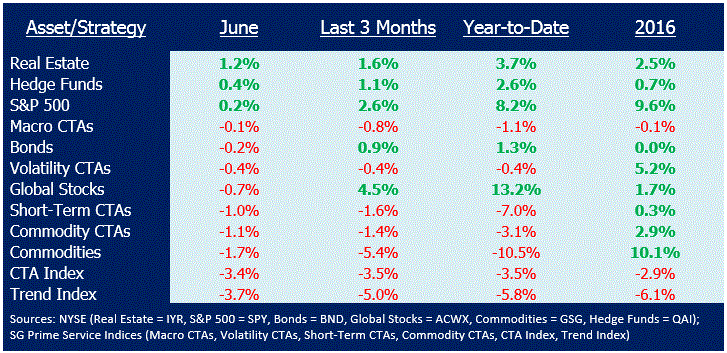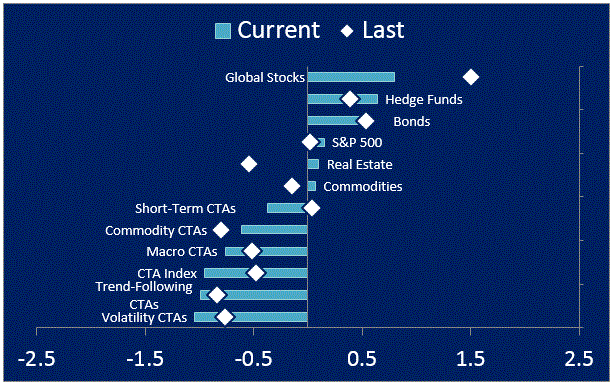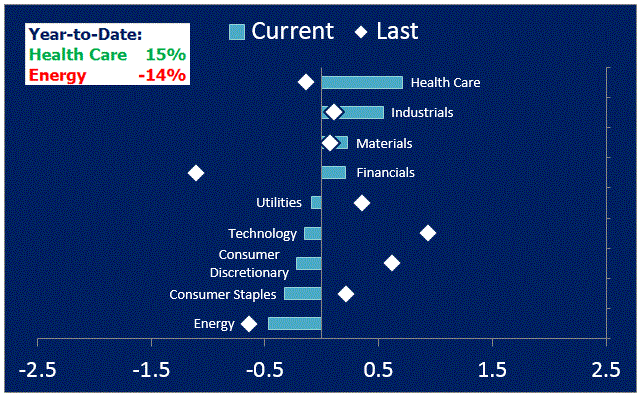September 11, 2017
Alternative Alpha - Emerging Market Envy
Greed makes people do questionable things. Of course, envy does too.
And I’d say U.S. investors have to be getting pretty jealous of foreign investors after the first half of 2017. The S&P 500 is up 8.2%... but global stocks are up 13.2%... and emerging-market stocks are up 18.2%.
Past results are not necessarily indicative of future results. Futures trading is not suitable for all investors.
The sad part is, many investors will likely be tempted into the global stock market bull rally at just the wrong time, becoming envious of the steady gains stocks have provided during the second-longest – and “most hated” – bull market in history.
Any investor still on the sidelines – now green with envy - faces a cruel conundrum: stocks are expensive, and therefore unlikely to provide above-average results over the next eight years, as they have over the last eight.
This is where we believe Managed Futures can fill the gap – giving investors an opportunity to potentially earn positive risk-adjusted returns, outside the stock market, for the next several years.
We’ve always touted Managed Futures as a powerful diversifier. CTA returns have historically shown a very low correlation to both equity and fixed-income markets, making them a true value-add to a traditional “60/40” portfolio of stocks and bonds.
What’s more, academic studies and practitioner experience have shown CTAs may be able to provide “crisis alpha” – essentially, strongly-positive returns during periods of stock market crisis.
So, if you think a perfect storm is brewing in equity markets today – or, perhaps, even if you don’t - now’s a great time to give alternatives a close look.
Later, we’ll take a closer look at emerging CTA managers and the unique value-add they offer. First, let’s have a look at our Global Strategy Scorecard.
Global Strategy Scorecard
Clearly, stock markets continue to be the “best house on a bad block.”
Despite fears of an over-zealous Federal Reserve, and its plan to unwind its $4 trillion balance sheet, equity prices around the world have continued to march higher. Global stocks have taken the baton from U.S. stocks, leading the pack with nearly double the S&P 500’s return so far this year.
Take a look…

It’s particularly interesting that emerging-market stocks are doing so well, given the renewed weakness we’re seeing in commodity prices, which are down 10.5% in 2017. If commodity prices were to recover from here, it would be a real boon to emerging market stocks. These trends could, if they developed further, give the global bull market another shot in the arm, sending prices higher in the near term.
But new investments into this long-in-the-tooth bull market should be considered carefully. While the Managed Futures space has lagged equity markets during this extended bull market (as they’re generally expected to do), we continue to believe “alternatives” are a must-have diversifier, due to shine during the next downdraft in “traditional” stock and bond assets.
Hedge Funds on the Move
Even though passive equity has reigned in 2017, hedge fund performance has gained steam in the last three months. The chart below shows how global stocks are still producing above-average returns, but not as strongly as they were as of last month. Hedge funds, on the other hand, are gaining momentum in this market. Take a look…

Sources: NYSE (Real Estate = IYR, S&P 500 = SPY, Bonds = BND, Global Stocks = ACWX, Commodities = GSG, Hedge Funds = QAI); SG Prime Service Indices (Macro CTAs, Volatility CTAs, Short-Term CTAs, Commodity CTAs, CTA Index, Trend Index) Calculations: Z-score of trailing 3-month return relative to trailing 36-month return.
Both volatility-trading and trend-following CTAs have struggled over the last three months, likely due to dampened volatility (thanks to the Fed!), increased correlation between stocks and bonds, and generally poor performance in the commodities sector. This shows the continued underperformance of “active” strategies, relative to “passive” equity. The silver lining for “active,” though, is the recent surge in hedge fund performance. As we’ll show next, hedge funds are likely capitalizing on the large spread between leading and lagging stock market sectors.
Health Care Up, Energy Down
The U.S. health care system remains a political hot topic. But uncertainty over the future of the Affordable Care Act has yet to faze health care stocks, which are up 15% in 2017. The sector’s performance over the last three months has been particularly strong, even as Congress wrestles with reform. Meanwhile, the energy sector has been a real sore spot for investors this year. It’s down 13.8%, owed largely to the staggering drop in oil prices, down 18% in 2017.

Sources: NYSE (XLV, XLI, XLB, XLF, XLU, XLK, XLY, XLP, XLE) Calculations: Z-score of trailing 3-month return relative to trailing 36-month return.
While hedge funds can take advantage of stock-sector dislocations – since they can go long/short within the stock market – the Managed Futures space thrives during dislocations among the major asset classes, including stocks, bonds, commodities and currencies. It’s possible the renewed strength in hedge fund performance is the prelude to such global divergences, but only time will tell.
Early Bird Gets the Worm
They say “early birds get the worm.” Yet, for many, being an “early-bird” investor in an emerging manager can be daunting.
It’s a classic Catch-22.
You feel safer investing with an emerging manager, after you see a good amount of assets under management (AUM) and a track record. But emerging managers – often very talented ones – often have difficulty establishing themselves, since large institutional investors gravitate toward large, established managers.
Faced with the perception that established managers are less risky than emerging managers, a majority of investors take the “easy” road and invest with the big boys. Although, as is often true in life and the markets, the “easy” road isn’t always the “best” road.
Let’s first explore the underappreciated value of investing with an emerging manager. In general – and we’ve found this to be true of the ones we work with - emerging managers are hungry! If success breeds complacency, emerging managers have none of the fat-and-happy syndrome that can make established managers slip. What they do have is new ideas, cutting-edge research and novel strategies.
It’s hard to teach an old dog new tricks. But “new tricks” are precisely in the wheelhouse of new managers. Therefore, emerging managers can flex competitive advantage in their ability to bring new strategies to market. And from your perspective – as the investor - staying ahead of the curve often requires listening to an emerging manager’s fresh outlook.
Emerging managers can also be more flexible and nimble than established managers, whose capacity to employ niche strategies and trade in liquidity-challenged markets can become significantly constrained as their AUM grows.
Various studies have shown the tendency for the returns of large, established managers to cluster around the group’s median return. This could be because large managers are increasingly forced into financial sector markets (highly liquid), and out of smaller diversifying markets (less liquid), as their AUM grows.
It could also be explained by the tendency for large managers to become increasingly risk averse as their management fees grow. Either way, compressed dispersion of returns is typical among large, established mangers.
Meanwhile, several studies have also shown that emerging managers are generally able to produce higher returns than established managers. Aggarwal and Jorion1 completed one such study, analyzing the returns of nearly 1,000 hedge funds, including managed futures (CTA) programs, over a 10-year period.
They found that emerging managers were able to produce 2.3% excess alpha during their first two years of trading. Excess returns for individual funds were persistent for up to five years, then subsequent returns decreased by an average of 42 basis points each year thereafter1.
Finally, early-bird investors can often negotiate attractive fees structures with emerging managers and pay far less than the standard 2/20. Cliff Asness of AQR has said the only way he’s found to increase the returns of most strategies is to charge lower fees for them. And of course Jack Bogle of The Vanguard Group would whole-heartily agree with that sentiment – “a penny saved is a penny earned.”
All told, there are clear advantages, from multiple perspectives, to investing with emerging managers. And so it begs the question: what’s stopping investors from doing so?
We believe it comes down to the perception of risk.
Psychologically, it’s easier for individual investors and institutional allocators alike to “herd” invest with a small group of the biggest and most established managers. It feels safer, psychologically, even if it isn’t the optimal thing to do.
Indeed, overcoming that psychological barrier is a formidable challenge. But it can be done. You just have to ask the right questions.
Due diligence is an important process for all allocation decisions, but particularly so for investors considering emerging managers. That’s why we recommend individual investors seek the guidance of trusted managed futures veterans, like Capital Trading Group. Our experience with emerging managers allows us to separate the wheat from the chaff, so to speak, and match investors with the emerging managers who are best aligned with their investment objectives.
Call us at 877-285-0391
Review CTG's Videos, White Papers and other resources below:
(1) Aggarwal, R. and Jorion, P. The Performance of Emerging Hedge Funds and Managers. Journal of Financial Economics. Volume 96, Issue 2, May 2010, pages 238-256.
_______________________________________________________________________________
Capital Trading Group, LLLP ("CTG") is an investment firm that believes safety and trust are the two most sought after attributes among investors and money managers alike. For over 30 years we have built our business and reputation in efforts to mitigate risk through diversification. We forge long-term relationships with both investors and money managers otherwise known as Commodity Trading Advisors (CTAs). We are a firm with an important distinction: It is our belief that building strong relationships require more than offering a well-rounded set of investment vehicles; a first-hand understanding of the instruments and the organization behind those instruments is needed as well. Futures trading is speculative and involves the potential loss of investment. Past results are not necessarily indicative of future results. Futures trading is not suitable for all investors. Nell Sloane, Capital Trading Group, LLLP is not affiliated with nor do they endorse, sponsor, or recommend any product or service advertised herein, unless otherwise specifically noted. This newsletter is published by Capital Trading Group, LLLP and Nell Sloane is the editor of this publication. The information contained herein was taken from financial information sources deemed to be reliable and accurate at the time it was published, but changes in the marketplace may cause this information to become out dated and obsolete. It should be noted that Capital Trading Group, LLLP nor Nell Sloane has verified the completeness of the information contained herein. Statements of opinion and recommendations, will be introduced as such, and generally reflect the judgment and opinions of Nell Sloane, these opinions may change at any time without written notice, and Capital Trading Group, LLLP assumes no duty or responsibility to update you regarding any changes. Market opinions contained herein are intended as general observations and are not intended as specific investment advice. Any references to products offered by Capital Trading Group, LLLP are not a solicitation for any investment. Readers are urged to contact your account representative for more information about the unique risks associated with futures trading and we encourage you to review all disclosures before making any decision to invest. This electronic newsletter does not constitute an offer of sales of any securities. Nell Sloane, Capital Trading Group, LLLP and their officers, directors, and/or employees may or may not have investments in markets or programs mentioned herein.


